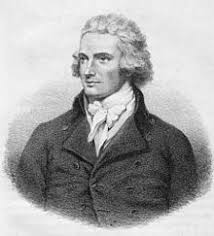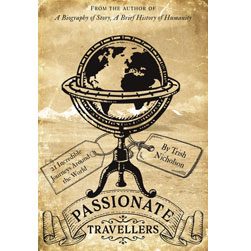
My previous post explained ways in which ‘passionate travellers’ raised funds to undertake their journeys. But what happens if you become destitute en route a long way from home?
Today, long-distance travellers and backpackers may cover their costs by seeking sponsorship from travel companies and magazines or by monetizing their internet accounts; others take on short-term work, picking fruit or serving in bars. Even if the worst happens and we are left penniless – loss or theft of cards and cash for example – there are consulates, insurers, fellow travellers and internet support networks to help us out of a fix.
It was much more difficult in the eighteenth century but, occasionally, an unexpected skill could enable a traveller to survive.

One of my passionate travellers, the Scottish naturalist, Mungo Park, had started on his first journey through West Africa in search of the River Niger well equipped, and with notes of credit for local traders at points along his way. But three months into his journey, and about 200 miles from the Niger, Park was captured by a band of Moors, robbed, and held prisoner.
It was another three months before Park had the chance of escape. With little more than the clothes he stood in, his horse as emaciated as himself, he continued his journey as best he could while struggling with repeated rainy-season fevers. Reduced to beggary and barely recognisable as a European, he earned food by writing saphies – Arabic prayers written on slips of paper, valued as powerful amulets to ward off evil or attract wealth where few could read or write.
When Park had first arrived in West Africa, at a trading settlement on the Gambia River, he became aware of the area’s cultural and social diversity and took time to learn the most commonly spoken Bantu language, Mandingo. But he was also proficient in Arabic, and it was this knowledge that later saved his life.
Park became so ill that he would undoubtedly have died by the roadside had he not met a Muslim Bantu trader, Karfa Taura. Taura discovered that Park could read to him his Arabic prayer book, and had him nursed to recovery in his own household.
And it was acquired skills that enabled another equally determined passionate traveller to survive to tell the tale.

[Credit: shipsnostalgia.com]
After the African, Olaudah Equiano (aka Gustavus Vassa), was abducted into slavery as a child, he was put to work aboard trading vessels and warships by a Naval officer, Henry Pascal, who bought him from a plantation owner in Virginia. Quick to learn, he benefitted from schooling offered in the British navy’s larger ships when he served on HMS Namur* during the siege of Louisbourg, Nova Scotia. But slaves and ship’s boys were considered dispensable, and during naval battles of the Seven Years War between Britain and France, Olaudah worked as a ‘powder monkey’ on both the Namur and the frigate HMS Roebuck.
‘Boys were deployed as powder-monkeys because they could run fast … and because they were easily replaced. For safety, gun powder was kept in canisters in the ship’s hold, well away from the match-tubs which ignited the charges the gunners rammed into the cannons. Olaudah ran back and forth carrying containers of explosive powder between the hold and the crowded gun-deck while enemy fire exploded around him, flinging lethal shot and splinters in every direction. He witnessed “the dreadful fate of many of my companions, who, in the twinkling of an eye, were dashed in pieces.”’ [Passionate Travellers pp.36-37]

Olaudah survived and, to his great sorrow, Pascal sold him for £40 to Robert King, a trader in Philadelphia. King was so impressed with Olaudah’s skills and education that he trained his new slave to run his trading routes in the Caribbean. He also promised Olaudah that he could buy back his freedom for £40, and allowed him to make small trade on his own account. At this stage in his journey, Olaudah’s passion became the pursuit of freedom.
In his first venture, ‘with initial capital of three pence he bought a glass tumbler in the Dutch island of St. Eustatia and sold it in Montserrat for sixpence.’ Being a slave, and a ‘black’ man, Olaudah had no protection in law – ‘white’ customers often took his goods and refused to pay him – but eventually he raised the sum to buy his freedom. Robert King, surprised, initially refused to honour his promise. His skills in trade earned Olaudah his freedom on 11 July 1766 at the age of twenty-one years.
For a ‘black’ man in America, ‘liberty’ was conditional and always contested. After being beaten almost to death in Savannah, Georgia, Olaudah worked his passage to England…by the time Mungo Park began his first Journey to West Africa in 1795, Olaudah Equiano had become a prominent anti-slavery activist in London, but he lived for only a further two years.
*HMS Namur, a 90-gun warship built in 1756, survived nine sea battles including the battle of Trafalgar under Lord Nelson. In later years, she was captained by Charles Austen (novelist Jane Austen’s brother), and finally decommissioned and broken up in 1834 at Chatham docks where she had been built. Her timbers were buried beneath a dockyard warehouse and forgotten. Until 1997, when carpenters chanced upon the skeleton of a massive ship: it turned out to be the remains of Namur, now on display at the Dockyard Museum.
 For this series of posts, I have chosen specific themes familiar to most serious travellers, ‘armchair’ or otherwise, but in Passionate Travellers, I recount complete journeys of the past for you to follow step by step and discover why these travellers undertook such difficult and dangerous adventures, often risking their lives to achieve their quest.
For this series of posts, I have chosen specific themes familiar to most serious travellers, ‘armchair’ or otherwise, but in Passionate Travellers, I recount complete journeys of the past for you to follow step by step and discover why these travellers undertook such difficult and dangerous adventures, often risking their lives to achieve their quest.
Passionate Travellers: Around the World on 21 Incredible Journeys in History Order the paperback from your local bookshop, or from the Book Depository (freight free); ebook available from Amazon and all major digital outlets.
You can read the background to the book and discover who the travellers are here:
And read reviews on Goodreads
Other posts in this series which might amuse you include ‘Fleas, Bed Bugs and Other Travelling Companions’, ‘How to Detach Unwanted Leeches’, and for foodies, ‘Travel Snacks of the Past’.
You might also enjoy these related travel posts:
‘How to be a Welcome Guest in Bhutan’
‘Do you Know Your Bilas from Your Asgras?’
